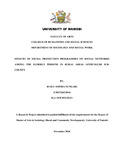| dc.description.abstract | The study sought to establish the effects of social protection programmes on social network among the elderly persons in rural areas in Githunguri Sub- County. The study sought to realize three objectives which included: To find out effects of the social protection programmes on individual, families and community social relationships to the elderly persons; To find out changes that has occurred in beneficiaries‘ social networks and social status; and to establish the social impacts of social protection programmes to elderly persons. Social protection programmes are government initiatives to support the vulnerable groups such as elderly persons, orphan and vulnerable children and people living with severe disabilities. This programme strongly contributes to reducing poverty, isolation, exclusion, and social economic inequality among the vulnerable groups thus improving the beneficiaries livelihood. Proper implementation of social protection programmes can enhance social networks among the elderly persons and other community members. It enables the beneficiaries to attach in the circle of their extended family and communities, decreasing the social distance between the poor and the wealthier households.
The study employed both quantitative and qualitative methods and tools of data collection were used in collection of primary data. Secondary data was also obtained from the written literature. Proportionate stratified random sampling was used to identify 124 respondents for household interviews and purposive sampling to select the eight participants of key informant interviews. The data was analyzed descriptively using computer software SPSS and presented using diagrams, tables, graphs and pie charts. The study found out that social protection programmes has positive effects on elderly persons livelihood and well-being thus building stronger social networks in the family and community at large. Their social relationship with the family members and the entire community has improved thus strengthening their social status. The beneficiaries are now able to participate in community activities and even being given positions to lead different groups in the community. On contrary the study found negative effects of the programme which has brought division in the family level. Other beneficiaries stated that the non- beneficiaries are jealous and this weakens their social networks. The study recommends government to scale up the programme to include all the deserving elderly persons in the country, Ensure that the assistance is given regularly and is predictable. Further, ensure that the public understand the programme main objective and the criteria used in selection of beneficiaries to deal with the issues of division and jealous within the family and community levels. | en_US |



